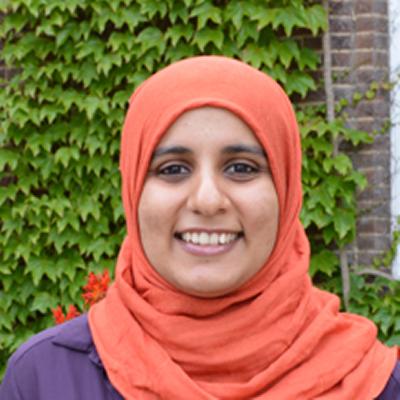Sana Rashid MSc Social Statistics, 2016
PhD Researcher at the University of Southampton

Southampton’s Mathematics department had this fantastic scholarship which helped me support my studies, so as an international student that was very attractive.
What were you doing prior to studying your PhD here?
I did my undergrad here, as well as my master's, so I’ve been here a long time!
Why did you choose to study at Southampton?
Prior to going to university I lived in Pakistan. I applied to quite a few UK universities, but Southampton’s Mathematics department had this fantastic scholarship which helped me support my studies, so as an international student that was very attractive.
What did you study at undergraduate level?
At undergraduate level I did BSc Maths with Actuarial Science.
Why did you stay on to do your master’s?
I stayed on to do my master’s because I really liked the statistics modules during my undergraduate degree, and I really wanted to learn more about statistics, and I thought doing a master’s at Southampton was the perfect way to do that.
How have you found the support from the University?
The support at Southampton has been great throughout my undergraduate, masters and PhD. It gets better and better the longer you’re here and the more you get to know the staff and your fellow students. The staff really treat students like friends which makes it very easy to approach all of the academics within the unit, as well as academics from neighbouring units, which in my case was the different academics units within the school of Social Sciences, so I actually moved from the School of Maths to the School of Social Sciences and then had connections in both, which was very useful. The group within Social Statistics is very strong. Just yesterday we were actually discussing how the Social Statistics research area at Southampton is very strong and there’s a lot of PhD students that come out of here, which makes the network very strong because you learn a lot and get to see people at conferences who you know, and everyone has connections with members of other universities, in other countries as well, so the number and diversity of people that you get to know is definitely a benefit.
What did you think of the teaching on your course?
The teaching at Southampton is very good, and I’ve seen both sides of it. As an undergraduate and master’s students I’ve been on the learning side of it, but as a PhD student I’ve also taught students and taken on the role of a tutor, which has let me reciprocate that support that I’ve received from the University and the lecturers by being there for my students if they ever had problems or questions.
Can you describe your PhD programme?
My PhD is basically based in two different departments; Social Sciences and Mathematical Sciences, and I have a supervisor from each. I work on data confidentiality, and we work on models which protect confidential data, whether that be for businesses or for individuals, so I borrow strengths from both departments. I take advantage of the strengths of the technical side of it from Maths, and of the application side of it from Social Sciences.
What have been the benefits of your degree?
Statistics is one of those subjects that you can apply to a lot of different areas and I’ve found that it’s made me very flexible with the technical knowledge that I have. Also the experience that I have with dealing with people during my PhD I think has prepared me excellently for any job that I have in the future.
What was the social life like in Southampton?
Southampton has a great social life. Although I’m not the type of person to go out and party, there’s so much else to do. There’s hundreds of students clubs and societies to get involved in. I, personally, was involved in quite a few as an undergraduate, but as I progressed to my master’s and PhD I found slightly less time to do these things but I’ve never found it difficult, when I did have the time, to join in on an event or activity that one of those societies was hosting, be that sports-related or music-related.
Do you have any advice for prospective students?
The strengths of the Statistics department speaks for itself, so you should look at the academic staff and see what they do, the research areas that they specialise in and I’m sure you’ll be able to find all the information that you need to make your decision.